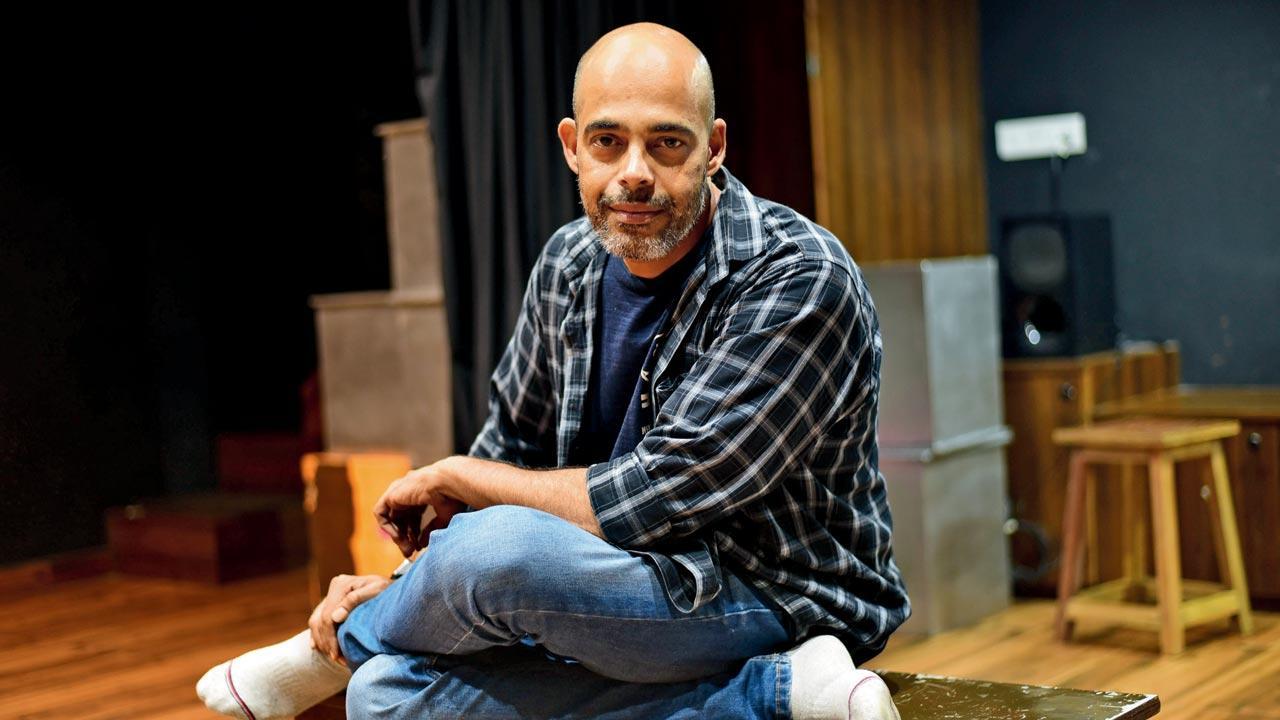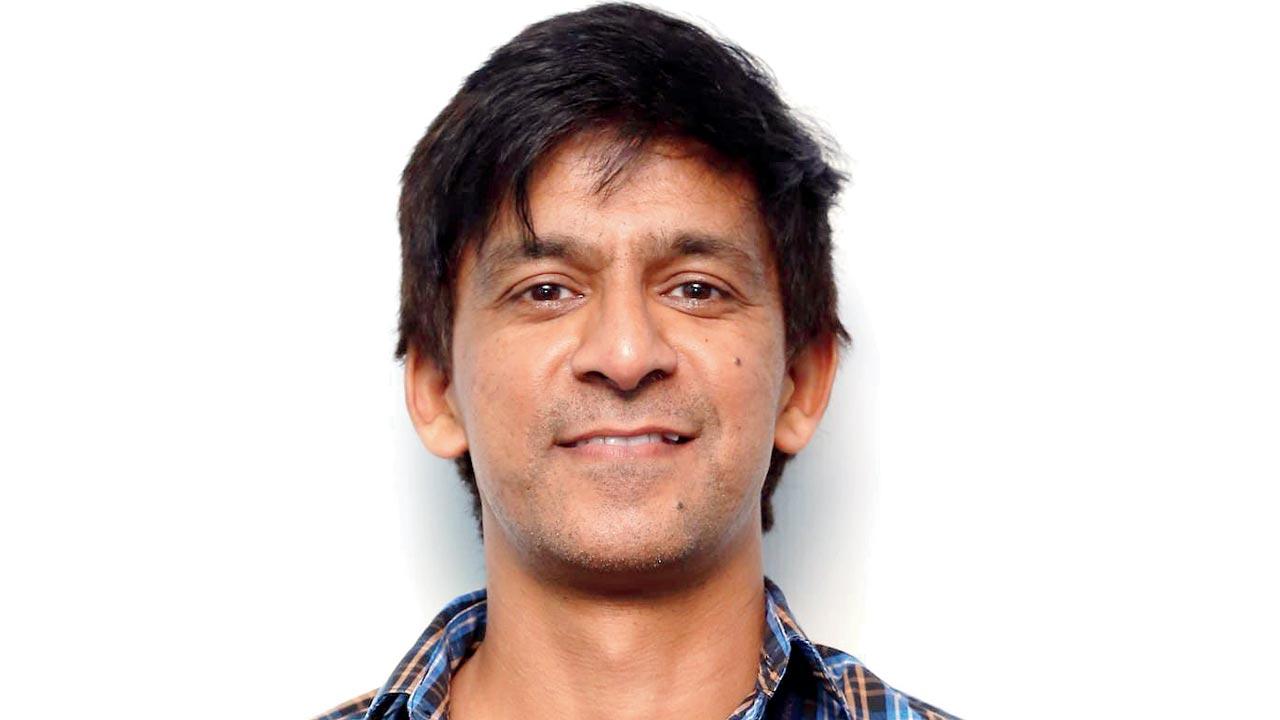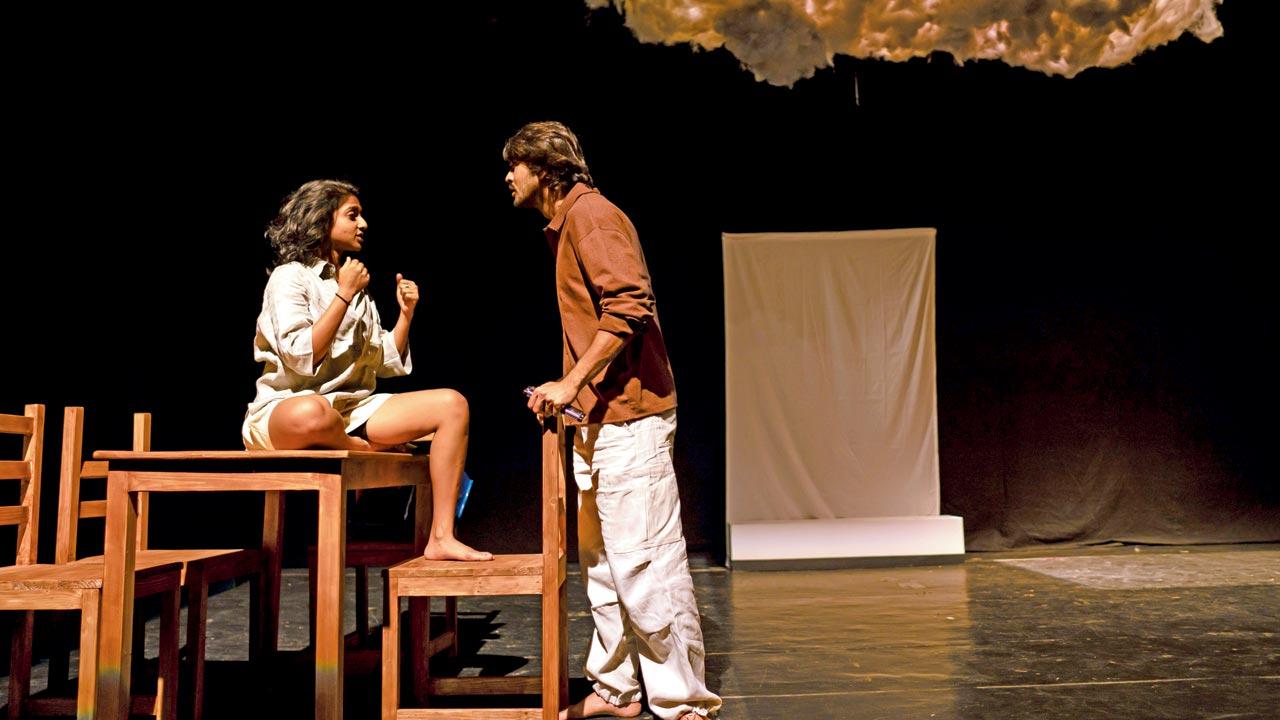Mohit Takalkar and Niranjan Pedanekar’s Marathi adaptation of a British play examines the cost of dystopian policies to the personal and political

Mohit Takalkar’s Ghanta Ghanta... is based on British playwright Sam Steiner’s play Lemons Lemons Lemons Lemons Lemons. Pic/Nimesh Dave
That we curate how we present ourselves on social media is an accepted reality—a consequence of the nature of platforms like Instagram and X. It also has much to do with the character or image counts built into their design; minor irritants in our everyday life that push us to measure our words. But what if this “character count” became a reality outside the virtual world, mandated by law and preventing us from uttering more than 140 words per day?
The Marathi play Ghanta Ghanta Ghanta Ghanta Ghanta, directed by Mohit Takalkar and adapted by Niranjan Pedanekar, imagines a brave new world coping with such limitations through the story of mismatched husband-wife duo Aditya (Lalit Prabhakar) and Feroza (Mallika Singh Hanspal), who must find a different way to communicate. Based on British playwright Sam Steiner’s 2015 work Lemons Lemons Lemons Lemons Lemons, the Marathi adaptation has earned numerous nominations at the 2024 Mahindra Excellence in Theatre Awards, as well as recognition for its direction and acting.
 Niranjan Pedanekar
Niranjan Pedanekar
Takalkar, a filmmaker and co-founder of the Aasakta Kalamanch, came across Lemons Lemons… four years ago when it was making waves at Edinburgh. Drawn in by Steiner’s craft, he thought its premise was utopian and fantastical, set in a “what-if”context. As he waited for a tougher, more ambitious theatre project to materialise in 2023, he itched to take on something new, thus setting his eyes on the play. Having engaged more deeply with the script, he “felt the urgency to take it on, because it was no longer a fantasy; it was just reality. I began to wonder what the consequences of such a policy may be, how would we cope?” Takalkar began to recognise similarities between the play and societies across the world.
Writer Pedanekar himself had just finished adapting another play when Takalkar brought up Steiner’s work. “First and foremost, it was the name that intrigued me… The play’s premise asks an age-old question: when life gives you lemons, what do you make of them? I wondered what the Marathi equivalent would be. Though English, too, is sarcastic, Marathi can be more scathing and cynical. I thought ‘Ghanta’ was the ideal response to the lemon question,” Pedanekar explains.
 The play tells the story of mismatched husband-wife duo Aditya (Lalit Prabhakar) and Feroza (Mallika Singh Hanspal), who are trying to communicate in a world where a person is assigned only 140 words per day
The play tells the story of mismatched husband-wife duo Aditya (Lalit Prabhakar) and Feroza (Mallika Singh Hanspal), who are trying to communicate in a world where a person is assigned only 140 words per day
“I was also struck by the non-linear nature of the play, which is composed of over 70 scenes. Some of the scenes were literally two lines long. My first task at hand was imagining the play in entirety,” says Pedanekar. Rather than re-arranging the scenes like the pieces of a puzzle such that they were in linear order, he chose to absorb the essence of the play and began translating it—churning out a first draft in two days, over seven-hour uninterrupted writing sessions, while he sat at Pune’s NIPR restaurant.
The overarching politics is a large, looming presence—a literal cloud, as depicted in the play’s set design. While the government in the Ghanta Ghanta… world terms the policy “anta shaanti”, the husband prefers to call himself a “shabda-bandi” (prisoner of words). The director, who has previously steered political plays like Kashmir Kashmir, underscores that the authoritarian governance he depicts in Ghanta Ghanta… is not meant to represent a certain party or dispensation. If anything, this speaks to the universality of the play’s themes, and its potential to be adapted in more languages.
“In the years after the COVID-19 pandemic, the world has shrunk,” Takalkar remarks. “A person residing in Japan, Germany and India was dealing with similar circumstances—though the degree of these circumstances may have varied, especially in a country like ours where caste, economic disparity and gender are significant factors. The rise of Right-wing politics globally, expressed in the direction countries are taking and the speeches their leaders are making, made Lemons Lemons Lemons Lemons Lemons seem like a play suited for many contexts.” He believes in art which speaks directly to the audience, rather than relying heavily on metaphor or parable.
In Takalkar’s own career as a thespian, this play stands out for a variety of reasons; for one, unlike most plays undertaken by Aasakta Kalamanch, it will be staged over 25 times. Traditionally, the troupe assigned this upper limit to themselves so they could immediately move on to newer projects, using the momentum and energy of successful projects in the past to be more innovative and experimental. “After 25-30 shows, I have been toying with the idea of staging the play in Hindi,” he reveals.
Pedanekar reminds us of the complexities of Aditya and Feroza’s relationship, in the face of difficulties that the play sensitively addresses—of secrets, confessions and words that were held back. In a pivotal scene before the law is passed, the husband and wife decide to use the opportunity to say everything they have meant to.
Aditya and Feroza are different dispositionally, which has much to do with their own personal backgrounds: She is a sensible lawyer who made her own way in the world, he an idealist musician born into privilege. “There’s a point in the play when the husband runs out of the words assigned to him, but the wife has a few words left,” Pedanekar narrates, “Because she doesn’t want to engage in conversation with the husband, she begins articulating words at random. When she realises she still has five words left, she simply uses them to say ‘Ghanta’ over and over!”
 Subscribe today by clicking the link and stay updated with the latest news!" Click here!
Subscribe today by clicking the link and stay updated with the latest news!" Click here!








